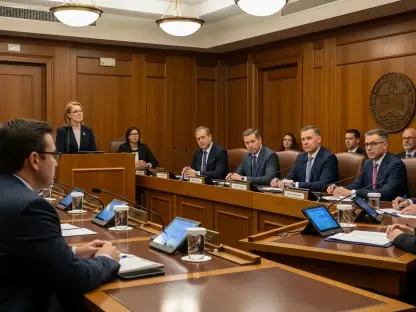As Australia grapples with the pressing need to modernize its aging infrastructure, a significant development has emerged that could redefine the landscape of public projects. Plenary Group, a key player in the realm of public-private partnerships (PPPs), has put forward a substantial bid for major government contracts, sparking discussions about the future of infrastructure funding and execution. This move comes at a time when the demand for efficient transportation, robust healthcare facilities, and advanced educational institutions is at an all-time high. With budget constraints limiting public spending, the Australian government increasingly turns to private sector collaboration to bridge the gap. Plenary Group’s strategic proposal not only highlights the potential for innovation in project delivery but also raises questions about how such partnerships can balance economic growth with societal benefits. This bid could mark a turning point, setting the stage for a new era of infrastructure development across the nation.
Shaping the Future of Public-Private Partnerships
Redefining Collaboration Models
The core of Plenary Group’s bid lies in its potential to reshape the framework of public-private partnerships in Australia. By targeting high-profile government contracts, the company aims to demonstrate how private investment can accelerate infrastructure projects while maintaining quality and accountability. This approach aligns with a growing trend where PPPs are seen as a viable solution to address the fiscal challenges faced by public entities. A successful outcome could establish a benchmark for future collaborations, encouraging other private firms to engage in similar ventures. The emphasis on structured alliances and expertise-driven solutions suggests that such models can tackle complex demands in sectors like transportation and health. Moreover, this bid underscores a shift toward shared responsibility, where risks and rewards are distributed more equitably between public and private stakeholders, fostering a sense of mutual trust and long-term commitment.
Economic Ripple Effects
Beyond the immediate scope of project delivery, Plenary Group’s bid carries significant economic implications through the lens of PPPs. Increased private sector involvement is likely to attract additional investments, stimulating local economies and creating job opportunities across various industries. This influx of capital could be particularly impactful in regions where infrastructure upgrades are overdue, providing a much-needed boost to community development. Additionally, the focus on efficiency and innovation in project execution may lead to cost savings over time, allowing public funds to be redirected to other critical areas. The potential for economic growth is further amplified by the possibility of drawing international interest, positioning Australia as a leader in modern infrastructure solutions. As these partnerships evolve, they could serve as a catalyst for broader policy reforms, ensuring that economic benefits are sustained and equitably distributed among diverse populations.
Driving Innovation in Infrastructure Development
Pioneering New Approaches
Plenary Group’s strategic bid is not just about securing contracts; it represents a bold step toward pioneering innovative approaches in infrastructure development. By leveraging cutting-edge technologies and streamlined project management practices, the company aims to address longstanding challenges such as delays and cost overruns that often plague public projects. This focus on creativity and efficiency could redefine how infrastructure is conceptualized and delivered, particularly in high-demand sectors like education and healthcare. The integration of sustainable design principles also reflects a growing awareness of environmental considerations, ensuring that projects meet modern standards of responsibility. If successful, this initiative could inspire a wave of modernization, encouraging other entities to adopt similar forward-thinking strategies and ultimately raising the bar for infrastructure quality across Australia.
Enhancing Public Service Delivery
Another critical dimension of this bid is its potential to enhance the delivery of public services through improved infrastructure. Upgraded transportation networks, for instance, could reduce commute times and improve connectivity, directly benefiting daily life for countless citizens. Similarly, modernized healthcare facilities would ensure better access to essential services, addressing disparities in regional areas. The ripple effects of such improvements extend beyond immediate convenience, contributing to higher productivity and overall societal well-being. Plenary Group’s commitment to robust implementation highlights the importance of aligning infrastructure projects with community needs, ensuring that the end result is not just functional but also transformative. This focus on service enhancement could set a precedent for how future projects prioritize public impact, reinforcing the notion that infrastructure is fundamentally about serving people.
Reflecting on Strategic Impacts
A Milestone in Policy Evolution
Looking back, Plenary Group’s bid stood as a defining moment in the evolution of Australian infrastructure policy. It highlighted the increasing reliance on public-private partnerships as a mechanism to meet ambitious development goals while navigating fiscal constraints. The strategic positioning of this bid underscored a broader shift toward greater private sector engagement, reflecting a pragmatic response to the urgent need for modernization. By focusing on key sectors such as transportation, health, and education, the initiative addressed critical gaps that had long challenged public systems. The emphasis on collaboration and shared expertise paved the way for a more integrated approach, demonstrating how policy could adapt to incorporate diverse strengths. This milestone offered valuable insights into balancing commercial objectives with public good, shaping the discourse on infrastructure funding for years to come.
Lessons for Future Endeavors
Reflecting on the implications of this bid, it became evident that several lessons emerged for future infrastructure endeavors. The importance of aligning private investment with public priorities was a key takeaway, ensuring that projects delivered tangible benefits to communities. Policymakers and industry leaders gained a deeper understanding of the need for transparent frameworks to govern PPPs, minimizing risks and maximizing outcomes. Moving forward, adopting flexible strategies to incorporate innovation and sustainability should be a priority, as these elements proved central to long-term success. Encouraging cross-sector dialogue could further refine these partnerships, fostering an environment where challenges are met with collective solutions. As Australia continues to build its future, the focus should remain on creating adaptable models that respond to evolving needs, ensuring that infrastructure remains a cornerstone of national progress.









